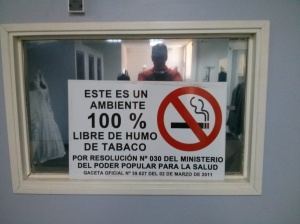The thin and the thick of it


Ubiquitous yet pointless

A land with no news
There are many things that are fat in Venezuela. The people are fat, mostly as a result of a terrible diet. And Diosdado Cabello’s wallet is fat.
But there are also a number of things that are thin, ultra thin.
Newspapers are Calista-Flockhart-thin. The picture above shows three, count’em THREE national newspapers. I guess you read about the paper crisis a lot, but when you actually buy El Universal and hold its squalid eight pages in between your fingers – that’s when you really want to cry.
This is not a problem that state-owned newspapers have. I bought El Correo del Orinoco last week, and the front page was splattered with the news that 20,000 turtles had been returned from captivity into the Orinoco river, thanks to the wonderful efforts of the Bolivarian government. I know this is true because it was told to me by a newspaper whose motto is to be “Part of the artillery of thought devised by the Supreme Commander of the Revolution, Hugo Rafael Chávez Frías, 1954-2013.”

Twenty thousand new voters
Don’t get me wrong, I love turtles as much as the next guy. But front page news for that? In a country with so many problems? Oh, chavista propagandists, never change. You make my job so much easier.
Of course, that was just the front page. One of the main news item in the inside pages was that Nicolás Maduro was going to work really super hard…

Putting the “press” in “depressing”
Then there are the signs, thin signs splattered all over the country. Never mind the billboards that greet you when you take the tunnel in between terminals at Maiquetía – the endless billboards of Chávez and Maduro. Those are a given. I’m talking about the mandatory signs in businesses.
There are signs everywhere announcing that no, you can’t smoke anywhere in Venezuela.

Ubiquitous yet pointless
Now, I applaud the anti-smoking efforts, but did you know that a pack of cigarrettes in Venezuela costs BsF 60? That’s less than a dollar at market rates. If you’re going to discourage smoking, you might as well use, y’know, the pricing mechanism. What is the point of discouraging smoking by banning it everywhere, when cigarettes are less than a dime a dozen?
Chavista heads are too thick to think through the logic of this.
Oh, and the thin paper that you make the cigarettes with – that is not scarce at all. You can buy cigarettes pretty much anywhere. Perhaps El Nacional can just buy a bunch of cigarrettes and use them to print their newspaper on…
Know what else is thin? The signs telling us that all forms of racism are forbidden, including “endorracism” … I still don’t know what that means, and if people don’t know what it means, what is the point of forcing businesses to put up signs forbidding it? It’s like forbidding any variation of Martian rugby.

Endo-what?
Of course, there are signs everywhere forbidding firearms. I’m sure people all over Venezuela respect those to the T – nobody carries a firearm into a store or a restaurant, right?
Kidding aside, I found it kind of charming when I saw the sign forbidding firearms plastered above the entrance of an ice cream store, done in pastel colors mirroring the motif of the store. Adorable! Who said the revolution wasn’t flexible?
The signs are a perfect allegory for what has become a billboard revolution. It is a revolution because the ads tell you it is.
Reality is quite different. The revolution is really about conspicuous consumption, about devaluation and increasing poverty. But read the billboards, and a different country emerges.
The signs reminding you that you have stepped through the looking glass are tall and wide, and barely an inch deep. Like the revolution that has spawned them, they have no depth, but they cannot be missed, and they will not be ignored.

Not afraid of the pink
Caracas Chronicles is 100% reader-supported.
We’ve been able to hang on for 22 years in one of the craziest media landscapes in the world. We’ve seen different media outlets in Venezuela (and abroad) closing shop, something we’re looking to avoid at all costs. Your collaboration goes a long way in helping us weather the storm.
Donate




